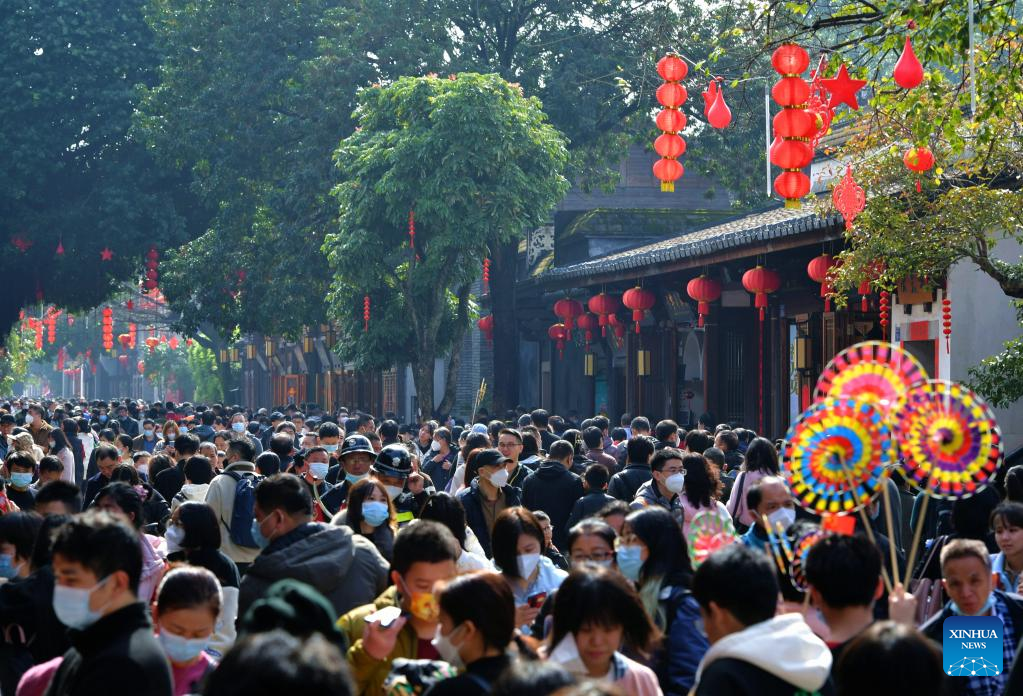Herd immunity protecting most people from COVID-19


Mass vaccination makes current situation safe, but uncertainty remains, expert says
Most people in China are safe from the spread of COVID-19 due to widespread vaccinations and newly gained natural immunity, but uncertainties remain in the long run, according to a senior medical expert.
Some 80 to 90 percent of people in China have acquired herd immunity for COVID-19 in the wake of the spread of Omicron-fueled outbreaks since December, Zeng Guang, former chief epidemiologist at the Chinese Center for Disease Control and Prevention, said in an interview with People's Daily on Wednesday.
The State-sponsored mass-vaccination campaigns of the last few years have managed to raise vaccination rates against COVID-19 above 90 percent in the country, he told the newspaper.
The combined factors meant that the country's epidemic situation is safe at least for now. "In the short term, the situation is safe, and the thunderstorm has passed," said Zeng, who is also a member of the National Health Commission's expert panel.
However, Zeng added that the country still faces the risk of importing new Omicron lineages such as XBB and BQ.1 and their subvariants, which could pose a great challenge to the unvaccinated elderly population.
The Chinese Center for Disease Control and Prevention said on Saturday that 3.48 billion doses of COVID-19 vaccines had been administered to about 1.31 billion people, with 1.27 billion completing a full course of vaccination and 826 million receiving their first booster.
Some 241 million people aged 60 and above received a cumulative 678 million vaccine doses, with 230 million completing a full course of vaccination and 192 million receiving their first booster.
China had 280 million people falling into that age group by the end of last year, according to the National Bureau of Statistics.
Zeng said China's COVID-19 policies take into account not only the infection and death rate from the virus, but also the needs for economic development, social stability and global exchanges.
The World Health Organization's emergency committee met on Friday and advised WHO Director-General Tedros Adhanom Ghebreyesus that the virus remains a public health emergency of international concern, the United Nations agency's highest alert level.
The WHO declared COVID-19 an emergency in January 2020.
On Monday, the WHO announced that COVID-19 will still be designated as a global health emergency as the world enters the fourth year of the pandemic.
However, Tedros said he was hopeful that the world will transition out of the emergency phase of the pandemic this year.
Zeng said the announcement was practical and acceptable given that nearly 10,000 people worldwide died of COVID-19 every day over the last week.
The death rate is the primary criterion for assessing the emergency status of COVID-19. The world's pandemic situation will only become better when there are no deadlier subvariants popping up across the globe, he said.
Zeng said the WHO's decision was aimed at lowering the virus' infection and death rate, and will not force countries to shut their doors after they just opened up.
"At present, the global pandemic control has marched a huge step forward, and the overall situation is getting better."
- PLA Daily: China resolute in winning anti-graft war
- China unveils regulations on Party organization elections within armed forces
- Pick your own cherished flowers in downtown Shanghai
- Liangjiang New Area of Chongqing inaugurated
- 17 rescued Filipino crew members transferred
- Team of Chinese, US scientists identifies key tumor cell state driving cancer growth, drug resistance




































